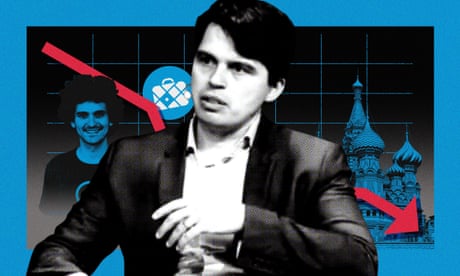- by foxnews
- 08 Apr 2025
Caught in the FTX storm: how a crypto high-flyer fell to Earth
Caught in the FTX storm: how a crypto high-flyer fell to Earth
- by theguardian
- 28 Mar 2023
- in technology

As western brands began the stampede out of Russia a year ago, its citizens found themselves unable to pay for the international goods and services with which they had become so familiar.
Among the first firms to sever ties were the credit card companies Visa and Mastercard, leaving Russians struggling to spend their cash on services from Netflix to Amazon.
And the reason? The discovery late last year that at least 111 Russian users were signed up for its app-based payment card, allowing them to use Maps to spend their cash, despite western efforts to isolate the country.
Those revelations represent the latest setback for Grebnev, one of a breed of tech entrepreneurs whose fortune has followed the boom and bust of cryptocurrencies. The former Goldman Sachs banker, who went to school with Rishi Sunak, has been caught in the fallout from the collapse of FTX, the failed crypto exchange run by Sam Bankman-Fried.
His story is one of wealth, ambition, the allure of the crypto world and the ethical questions thrown up for western companies with interests in Russia since the invasion of Ukraine.
Grebnev rose to prominence in the tech world through a series of ventures spawned by the blockchain technology that underpins cryptocurrency. His two main businesses would go on to command more than $100m (£81m) of investment combined and see the value of their tokens soar as the crypto hype exploded. Grebnev and his peers hoped to get people to buy into a vision of a new financial world without the need for traditional financial institutions and reliant entirely on digital currencies exchanged between individuals. These include Maps.me, which started out as a competitor to Google Maps, but became a multifunctional app with services such a pre-paid card.
Grebnev arrived in Britain as a teenager, attending the exclusive 600-year-old Winchester College boarding school alongside the future prime minister. A maths degree at Cambridge followed, then nine years at Goldman Sachs, developing trading strategies. Grebnev clocked up nearly six more years in the City, at Merrill Lynch, aiding sovereign wealth funds and corporates in developing markets.
He left to found his firm, Moonshot Capital, and in 2018 Grebnev partnered with a crypto exchange, Changelly, to launch Oxygen, a platform that allowed investors to earn money by lending out their cryptocurrencies, for a fee. Oxygen also later launched an eponymous crypto token.
He had bought Maps.me from Mail.ru Group, a London-listed Russian internet firm, for about $20m in 2020. Mail.ru had previously said 18% of its users were Russian. By the time Grebnev bought it, the app had been used by 60 million people in 195 countries.
He wanted to monetise those users by adding digital payments to the app, allowing them to transfer money while travelling abroad, in return for a fee. Oxygen would provide the payments infrastructure.
Lawyers for FTX claim to have located more than $5bn in assets as creditors aim to recoup their losses.
After a pilot scheme, the Maps Mastercard and wallet launched in October. As well as digital cards, Maps also offered physical plastic cards, which sources say were distributed in Europe and Dubai. Questions soon emerged about whether Russians were using the cards. A Maps channel on the Telegram messaging platform included many users with Russian phone numbers, who appeared to be located in Russia, screengrabs show.
The Maps wallet included a virtual sim function that would let people use their mobile phones abroad without incurring hefty roaming charges, by buying a data bundle. Sources claimed the virtual sim allowed Russians to exploit a loophole: users would appear to be located in the country they were buying the data from, allowing them to disguise that they were in Russia.
Monavate continued to have concerns that Russians might be using the app, and that N2 had not carried out sufficient checks to ensure that sanctions on Russia had not been breached. The EU had tightened sanctions on Russia in October, banning all crypto-asset wallets, accounts and custody services.
- by foxnews
- descember 09, 2016
Ancient settlement reveals remains of 1,800-year-old dog, baffling experts: 'Preserved quite well'
Archaeologists have recently unearthed the remarkably well-preserved remains of a dog from ancient Rome, shedding light on the widespread practice of ritual sacrifice in antiquity.
read more





